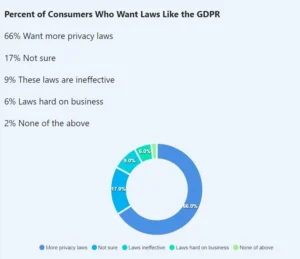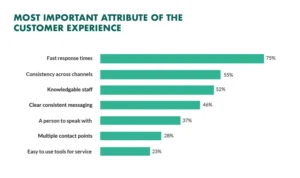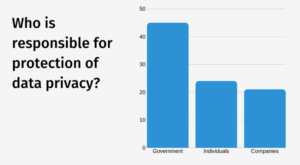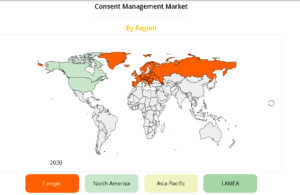Navigating the labyrinth of privacy in marketing has become one of the defining challenges for modern marketers. As the digital landscape grows, so does the complex interplay between consumer data, trust, and marketing strategies.
But why is there such an emphasis on privacy now? What is the importance of privacy in marketing? How have the dynamics changed in 2024?
And more importantly, how can businesses ensure they’re on the right side of both ethics and regulations?
Don’t fret if navigating the intricacies of privacy in marketing feels overwhelming; we’ve got you covered!
Read on to equip yourself with the latest insights and actionable solutions tailored for 2024’s unique challenges.
Let’s dive right in!
In today’s digital-centric era, personal data has become a crucial asset for businesses.
From targeted ads to personalized user experiences, data-driven strategies have reshaped the marketing landscape.
However, with this treasure trove of data comes a responsibility – the duty to respect and protect consumers’ privacy. Here’s a break down of the importance of privacy in marketing:
The era where businesses held all the cards is long gone. Today’s consumers are well-read, informed, and constantly connected.
They’re aware of data breaches, surveillance capitalism, and the dark side of the digital age.
By placing privacy at the core of marketing strategies, businesses send a clear message: “We value and respect you.”
What’s more, trust is not easily earned, but once established, it can lead to longstanding brand loyalty.
Consumers who believe their data is treated with respect are not only more likely to make repeat purchases but also become brand ambassadors, advocating for the business in their personal networks.
To understand this topic in more detail, you can check out this video by TEDx Talks.
The rising tide of regulations: GDPR and CCPA are just the tip of the iceberg. Countries worldwide are rolling out stringent data protection laws.
These aren’t just boxes to tick; they represent a global shift towards data respect and protection.
The High Cost of Non-compliance: It’s not just about potential fines, which can be astronomical.
The fallout from non-compliance can lead to lost consumer trust, public relations nightmares, and long-term brand damage.
We’ll go into more detail about the regulations and how they can address privacy issues in digital marketing in a later section.
Transparency breeds quality. When consumers understand what data is being collected and why, they’re more likely to provide accurate and valuable information.
This leads to more precise targeting, effective campaigns, and better ROI.
In addition, an overload of irrelevant data can be counterproductive. By respecting opt-outs and privacy settings, marketers can filter out the noise, focusing on quality data that yields actionable insights.
The digital ecosystem is in constant flux, with new platforms, tools, and consumer behaviors emerging regularly.
A strong privacy foundation allows businesses to adapt seamlessly, ensuring they’re always ahead of the curve.
By understanding privacy constraints, businesses can innovate more effectively, creating solutions that respect user rights while delivering value.
Beyond profit margins and growth charts, businesses have a societal role to play. They influence culture, norms, and values.
Prioritizing privacy is a testament to a brand’s ethical stance, showcasing its commitment to doing right by its consumers.
Moreover, marketers wield significant influence within organizations. By championing privacy, they can drive company-wide changes, fostering a culture of respect and ethical behavior.
Why Should Marketers Care About Privacy
Marketers must respect and protect consumers’ privacy to build trust with consumers, maintain regulatory compliance, enhance data quality, future-proof the business, and demonstrate ethical responsibility. Trust is built through transparent actions, which can lead to long-term brand loyalty and brand ambassadors.
The rapid expansion of digital platforms and the inherent value of consumer data have prompted a global drive for stricter data protection regulations.
Not only do these laws affect how businesses manage data, but they also redefine the scope and types of privacy in marketing.
Origin: Introduced by the European Union in 2018.
Key Provisions:
Implications for Marketing: GDPR has necessitated a shift in marketing strategies within the EU. Data collection methods have become more transparent, with clear opt-in procedures. Re-targeting strategies, email campaigns, and audience segmentation have all had to adapt to ensure compliance.

Origin: Enacted in California, U.S., effective from January 2020.
Key Provisions:
Implications for Marketing: The CCPA impacts all businesses that deal with Californians, regardless of the business’s location. Marketers have had to introduce clear opt-out options in their campaigns and be more judicious with data handling and storage.
Various countries have crafted their data protection frameworks, echoing the sentiments of GDPR and CCPA but tailored to their cultural and legal contexts. For instance:
Brazil’s LGPD (Lei Geral de Proteção de Dados): Focuses on transparent data processing and grants nine rights to data subjects, including access to data, correction, and deletion.
India’s Personal Data Protection Bill: Still under discussion, this proposed law emphasizes user consent, data localization, and stringent penalties for misuse.
With third-party data sources becoming less accessible due to these regulations, marketers are turning to first-party data, which is often seen as more reliable and compliant.
The restrictions on data collection and processing mean that hyper-targeted advertising, especially across borders, requires more diligent preparation and execution.
As explicit consent becomes a norm, there’s an opportunity for brands to engage consumers directly, explaining the value exchange in data sharing, leading to potentially richer and more meaningful interactions.

Marketing platforms are now offering features that assist in regulatory compliance, from ensuring data encryption to providing easy opt-out solutions for consumers.
Compliance is now a brand asset. Companies that proactively champion data protection are seen as more trustworthy, giving them a competitive edge in the market.
An Ever-Evolving List of Privacy Laws and Their Impact on Marketing
The global surge in data protection regulations, such as the EU’s GDPR and California’s CCPA, has reshaped digital marketing by prioritizing consumer privacy and redefining data collection practices. As a result, marketers are adapting their strategies to ensure compliance while leveraging these changes to foster deeper trust with consumers.
Privacy First Marketing is an approach where consumer data privacy is not an afterthought but the foundation for all marketing activities.
Instead of prioritizing data collection and then figuring out how to protect it, Privacy First Marketing reverses the process.
It emphasizes the protection and ethical use of data from the start, ensuring that all subsequent activities align with these principles.

Transparency: Every step in the data collection process is transparent to consumers. They know what they are collecting, why they are collecting it, and how they will use it.
Consent: Data is never taken without explicit consent. Consumers opt in rather than opt out.
Minimalism: Only the necessary data is collected, nothing more. This principle aligns with data minimization, where businesses only gather what they genuinely need.
Protection: Data security is paramount. Strong encryption and other protective measures ensure data remains safe from breaches and unauthorized access.
Empowerment: Consumers have the power to view, modify, or delete their data. They are in control, not the business.
What Is Privacy-First Marketing?
Privacy-First Marketing is a strategy that prioritizes consumer data privacy from the start, prioritizing protection and ethical use of data. It focuses on transparency, consent, minimalism, protection, and empowerment.
In an era where consumer data is both a valuable asset and a potential liability, brands are seeking robust solutions to ensure they handle this data responsibly.
Here are five comprehensive solutions, enriched with details, to guide businesses in their quest for data protection and compliance:
PIAs, or systematic evaluations, are carried out by privacy consulting businesses.
They investigate a company’s data processing operations, evaluating how personal information is handled, saved, and shared.
PIAs offer a multi-faceted benefit.
Firstly, they identify potential risks and vulnerabilities, allowing businesses to address these issues proactively.
Secondly, they ensure alignment with regulatory standards, like GDPR. Lastly, by regularly updating PIAs, brands can demonstrate their commitment to data protection, enhancing consumer trust.
This software provides a comprehensive visual representation of the data landscape within a business. It tracks the origin, processing , and the storage or transfer of personal data.
Data mapping demystifies the often-complex data networks within businesses.
By visualizing data flow, businesses can identify bottlenecks, vulnerabilities, or redundancies.
Taking a proactive approach ensures that you can identify and rectify any potential breaches or mismanagement early.
These specialized software solutions, CMPs, are designed to manage user consents across digital touch points.
They handle consent logs, user preferences, and facilitate requests like data access or erasure.
n an environment where explicit user consent is paramount, CMPs ensure that brands collect data ethically.
They automate the often-tedious process of tracking consents, ensuring brands can focus on their core marketing activities without fearing non-compliance.
Plus, with easy opt-out options, they enhance the user experience, further building trust.

These are marketing firms whose tactics stress data privacy. Moreover, they understand legislation and provide services that integrate marketing objectives with data protection requirements.
Tapping into the expertise of privacy-first agencies ensures that brands don’t have to sacrifice marketing efficacy for compliance.
These agencies understand the nuances of crafting compelling campaigns that resonate with audiences while ensuring every step is compliant. It’s a blend of creativity and responsibility.
Privacy consulting organizations provide these instructional seminars to keep businesses up to date on the ever-changing world of data security.
Data protection isn’t static. As regulations evolve and new challenges emerge, brands need to stay informed.
Regular training ensures that all team members, from marketing to IT, understand their roles in data protection.
It cultivates a culture of compliance and proactive protection within the organization.
5 Solutions to Help With Compliance
Marketers understand that data, while a powerful tool, comes with its own set of obstacles and obligations. The emphasis on privacy in marketing is not a passing fad but rather a reflection of the changing relationship between brands and their customers.
As we’ve delved into the intricacies of privacy laws and explored solutions for compliance, a recurring theme emerges: the value of trust. In a landscape filled with data breaches and skepticism, the brands that prioritize privacy are not just ticking regulatory boxes; they’re building trust with their consumers.
In the years ahead, the digital world will only grow more complex. New platforms, tools, and consumer behaviors will emerge, bringing fresh challenges to the fore.
However, the core of the matter remains unchanged. Brands that anchor their strategies in respect for privacy, transparent communication, and genuine consumer value will not only navigate these challenges but will also lead the way, setting benchmarks for ethical and effective marketing.
Privacy is taking center stage in marketing for several reasons. Firstly, consumers are becoming more aware of their digital rights and the value of their personal data, leading them to demand more transparency and control. Secondly, regulatory bodies worldwide are introducing stringent data protection laws, making compliance a necessity for businesses. Lastly, in an age where trust is a significant brand differentiator, respecting consumer privacy can set a brand apart, fostering loyalty and long-term engagement. Read the full guide for more information. For brands to remain compliant, it's essential to continuously educate themselves on evolving privacy laws relevant to their operations. Regular data audits can help pinpoint potential vulnerabilities, ensuring that data collection and processing practices align with regulations. Implementing tools, especially consent management platforms, and seeking expert advice can further streamline the compliance process and safeguard against potential pitfalls. To learn why this is important, read the full guide. Adopting a privacy-first approach in marketing offers multifaceted benefits. Brands not only enhance their trust quotient among consumers but also ensure they stay on the right side of evolving regulations. Additionally, in a saturated market, a clear stance on privacy can set a brand apart, offering a unique competitive advantage. Read the full guide for more information on regulations and how they affect marketing.Frequently Asked Questions
Why is privacy becoming such an important consideration in current marketing strategies?
How can brands stay compliant with global privacy regulations?
What benefits do brands gain from a privacy-first marketing approach?
Intersoft Consulting: General Data Protection RegulationGDPR
CSO: California Consumer Privacy Act (CCPA): What you need to know to be compliant
Tech Target: What is a privacy impact assessment (PIA)?
Header Biding: What Is a Consent Management Platform (CMP)?